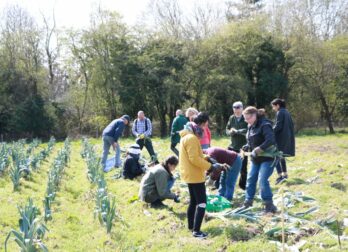Community Business Market report: sector is resilient, but more investment needed
By News Team
As communities across England face a recession, rising costs of living and continued pressure on public services, new research shows how community businesses are plugging the gap in local support.
The 2022 Community Business Market report, the 8th annual largest sector report for Power to Change by CFE Research, reveals:
- Those offering public-facing support were nearly twice as likely to report increasing demand for support with the cost of living
- 77% of community businesses had reported an increased demand for support related to the costs of food, and 79% for support related to increase in the costs of energy
- 45% of community businesses reported they had employed someone who had no previous paid employment in the last 12 months, who are furthest from the labour market
11,000 resilient community businesses operating in England contribute to the economic, social and environmental wellbeing of communities, with 95% saying it’s their primary purpose. With a total income of just under £1 billion, community businesses are owned by, rooted in, and accountable to their communities, trading for the benefit of their communities. However, the report demonstrates a concerned sector, facing insecurity and a need for investment.

Community businesses are facing the same challenges as the private sector, with an additional requirement to meet growing demand and changing needs. Run by local people who are experts in their communities, they have adapted through the post-pandemic period and those providing public-facing support services have increased by ten percent since 2021, to 31%. This flexible sector responds quicker than traditional support services, and many have explored new areas of delivery including community tech: 36% created or adapted new technology, and 31% digitised existing or introduced new digital services.
Impact on employment
Amongst a backdrop of rising unemployment, community businesses buck the trend, providing high quality work and volunteering opportunities, with 86% of staff living locally. The sector continues to build skills and employability for those furthest from the job market and this year, 45% of community businesses reported they had employed someone who had no previous paid employment in the last 12 months, this is equivalent to 1,514 in total.
As demonstrated through the Covid-19 pandemic, community businesses operate at the forefront in times of crisis. The report demonstrates how a disproportionate amount operate in areas facing multiple disadvantage – 48% are in the 30% most disadvantaged areas in England (IMD 1–3). In the current climate, use of the vital services that they provide will continue to rise.

Those serving economically or educationally disadvantaged people were a third more likely than others to experience greater demand for support with increases in food and energy costs and those offering public-facing support were nearly twice as likely to report increasing demand for support with the cost of living.
Tim Davies-Pugh, CEO of Power to Change, said: “We know that community businesses improve the social fabric of places and the services available to the communities there. In these turbulent times, they remain at the forefront of community-led regeneration, through providing vital infrastructure, facilities, and places for local people. With their ability to adapt and respond swiftly to their communities’ changing needs, community businesses are playing an integral role in levelling up the country towards a fairer economy.
“The report demonstrates a resilient sector, overcoming the challenges of the pandemic and rising needs of local people through the cost-of-living crisis. However, as they once again step forward to support their communities, we know that community businesses are concerned about their future. The report shows that with increased demand in services, along with potential funding and income deficits, the sector may be unable to cope with rising costs. That’s why we’re calling for greater investment from Government and funders for this community-led approach to continue to create thriving places.”
Concern about the future
The post-pandemic economic landscape is being shaped by a renewed appreciation of community-led responses to external challenges. With their sustainable business models and high local profile and impact, community businesses are well-placed to thrive. However, 37% of community businesses said they are less confident in their financial prospects for the next year.
Confidence in the financial future of the sector varies, as the 31% of community businesses that do feel confident in their prospects were still worried about the ongoing and emerging economic and social challenges.
A community farm commented: “The cost-of-living crisis has only just really begun to be felt. I think this is going to be a very difficult winter. I think projects like ours are going to be needed more than ever.”
With the right support, community businesses can continue to make a sustainable contribution to the social economy and help communities thrive. The report shows the sector needs renewed support to fully realise its considerable potential as finances remain fragile. Nearly two-thirds (64%) of community businesses aspire to grow trading revenue from existing sources, and 82% said they will seek new sources of grant funding.



